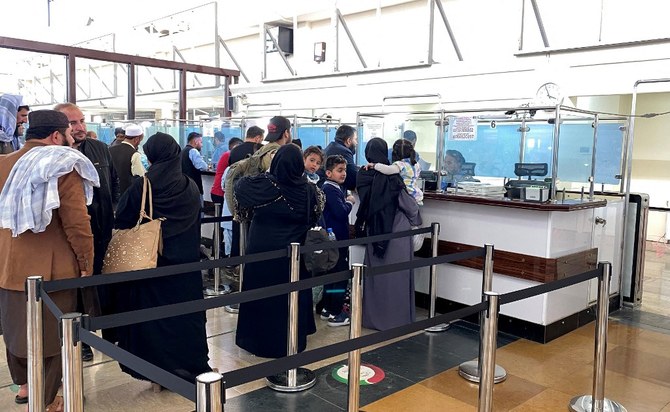LONDON: UK officials have told Afghans hiding from the Taliban they will need documentation approved by the regime in Kabul to travel to Britain, an investigation by the Independent has found.
Thousands of people are currently awaiting the chance to leave the country under the UK’s Afghan Relocations and Assistance Policy scheme, but campaigners say the policy of requiring approved papers asks them to “sign their own death warrant.”
The ARAP scheme was established after the fall of Kabul to the Taliban in August 2021, and is meant to provide safe passage and relocation for Afghans who worked with British forces and authorities in the country, as well as their families.
So far, 11,200 people have traveled to the UK under the scheme, but those numbers have dropped dramatically over time, down from 6,200 approved applications between July and September 2021 to just 743 in the last quarter of 2022.
The UK Ministry of Defence has apologized after the Independent uncovered multiple examples of ARAP applicants being asked to provide Taliban-approved documentation, including birth and marriage certificates, which also need to be translated into English.
One former interpreter who worked with British forces in Afghanistan was told to get his forms approved by the country’s Ministry of Foreign Affairs while he and his family were in hiding.
In an email sent to ARAP applicants, UK officials said: “We understand that some of you may have received communications from ARAP telling you to visit the local authorities or Ministry of Foreign Affairs to obtain new documentation for your relocation to the UK.
“If you received one of these messages, this was incorrect, and we apologise for any misunderstanding or distress caused by this message.”
The MoD has estimated there to be around 4,600 people eligible for the ARAP scheme currently stuck in Afghanistan.
A previous military scheme for evacuating Afghans after the collapse of the government in August 2021, Operation Pitting, told people to provide documentation “if you have them,” but campaigners say the MoD has strengthened its requirements for the ARAP scheme.
The requirements that papers and certificates be provided in English is a particular issue, as that is not standard practise in Afghanistan, meaning any such document needs to go through the Ministry of Foreign Affairs — potentially alerting the Taliban to the whereabouts of people in hiding or their intentions to flee.
Dr. Sara de Jong, co-founder of the Sulha Alliance charity, said the requirements by the UK government highlighted a lack of understanding about the situation in Afghanistan, adding that the Taliban had “pretty much stopped” issuing children’s passports, making it harder for families to travel.
Sarah Fenby, from the non-governmental organization Global Witness, told the Independent: “The fact that Afghan interpreters, who risked their lives for the UK’s mission in Afghanistan, are still left behind, despite gaining eligibility under ARAP, is shameful. They are hiding, afraid, and unable to work to feed their children.
“The fact that they are then being asked, by ARAP, to take their documents to Taliban-controlled ministries to have them validated is completely unacceptable.”
British Member of Parliament Tobias Ellwood, chair of the House of Commons’ defence select committee, said: “We need to ensure our offers of protection are not compromised. We must do the right thing.”
Dan Jarvis MP, who served as a soldier in Afghanistan, said: “Asking our Afghan allies to have their papers approved by the Taliban Ministry of Foreign Affairs is like asking them to sign their own death warrant.
“These requests by the UK government show a complete disregard to the grave realities eligible Afghans face, pushing desperate men into perilous situations.”
His Labour colleague John Healey, the party’s shadow defence secretary, said: “Britain has a moral duty to assist and protect them. Ministers urgently need to fix the ARAP scheme – and speed up applications and relocations.”
















